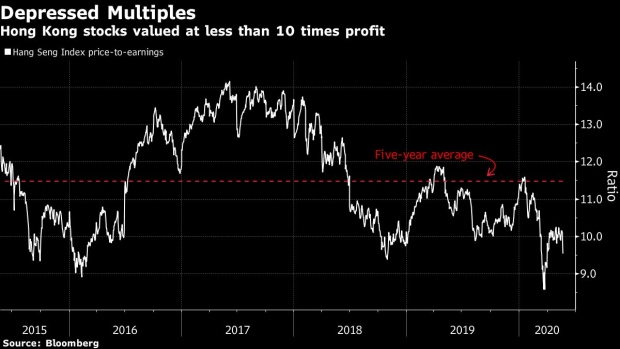May 25, 2020
Hong Kong Stocks Trade Like a Frontier Market as Pressure Rises
, Bloomberg News

(Bloomberg) -- Risks are mounting for Hong Kong’s stock market, the world’s fourth-largest, after the biggest plunge for the benchmark gauge in five years.
China’s shock decision last week to impose a law cracking down on dissent has led to a flare up of protests in the city, sparked concern over capital outflows and increased tensions with the U.S. That’s placed Hong Kong, and its financial markets, on the front lines of a growing clash between the world’s two largest economies.
The Hang Seng Index plummeted 5.6% on Friday, its worst drop since July 2015 when a bubble popped in China. A gauge of real estate companies sank the most since the global financial crisis, underscoring concern over whether investors will shift assets overseas, especially given sky-high prices for property. Currency traders piled into derivatives that profit from Hong Kong dollar weakness.
The slump left the Hang Seng trading at 9.5 times reported earnings, about half the multiple of MSCI Inc.’s global index and the biggest discount since 2016. Few benchmarks trade at single-digit valuations; those that do are mostly frontier markets such as Colombia, Argentina and Sri Lanka.
The Hang Seng Index was down 1.3% at 10:58 a.m. local time on Monday, while the MSCI Hong Kong Index slid 2%, taking its two-day decline to 8.8%.
For global investors, the question is whether such distressed levels are worth betting on. Those who called for a rebound in March -- when the gauge traded below book value for only the third time in history -- are now looking at similarly depressed valuations. The Hang Seng is back below that level, with traders pricing firms’ assets at 95% of their stated worth.
While a heavy weighting of financial companies, especially Chinese state-owned firms, has long depressed valuations for the gauge, there’s little doubt about the relative underperformance of the Hang Seng Index. It’s fallen to the lowest level relative to the MSCI All-Country World Index since 2004, and is languishing in its second bear market in as many years.
As an investment option, Hong Kong has taken a series of blows in recent years.
Concern over a U.S.-China trade war sent the gauge, whose companies generate a majority of their earnings in yuan, plunging 14% in 2018. A recovery the following year was all but snuffed out as violent clashes between police and protesters shattered the city’s image as a stable financial center. While Hong Kong has successfully controlled the coronavirus outbreak, its economy has sagged as the city shut its borders and residents limited spending.
The city has a reputation for bouncing back, whether it was the global financial crisis, SARS in 2003, or riots in the 1960s. Its stock market, however, faces a series of pressures that are hard to ignore right now. How the U.S. responds is a major concern.
Secretary of State Michael Pompeo indicated Friday that the U.S. would reconsider exemptions that shield Hong Kong exports from tariffs that apply to Chinese goods if Beijing moves forward with its national security law.
White House economic adviser Kevin Hassett said the same day that President Donald Trump and Pompeo would discuss possible responses over the weekend.
“I can say that the Chinese move in Hong Kong is going to be very, very bad for the Chinese economy and for the Hong Kong economy,” Hassett told reporters at the White House. “Hong Kong has been the financial center of Asia for a very, very long time. I don’t think it will continue to be and so the costs for China and are very, very large” if the government moves forward, he said.
©2020 Bloomberg L.P.